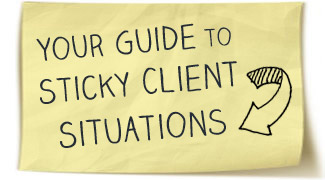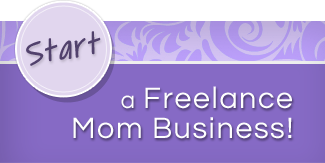
Have you ever watched a political debate and felt like the candidates weren’t really answering the questions they were asked?
Whether in interviews or public events, politicians and celebrities are often trained with “talking points.” We’re not just talking about a list of important things to discuss, like talking points on a meeting agenda.
These talking points are used by deflecting questions to somehow have to do with a set of prepared answers or talking points that drive home the politician’s view that he or she has rehearsed ahead of time for maximum conviction and convincing tone.
Why are we delving into the world of politics this week?
Because when you are new to sales calls or even just handling prospect questions over email, it’s all too easy to adapt a talking-points mentality.
The prospect asks if you can write a newsletter when you originally pitched them blogs? Don’t respond with your canned text on the important of blogging.
A prospect can’t afford your weekly one-on-one coaching and asks if you have any group sessions available? Don’t just respond with the results others have seen from coaching by more or less reading your testimonials page.
Countering objections is not only about listening and responding to exactly what the prospect is saying, but also about playing shrink/coach a little and delving into what is behind what he or she is saying.
How to Psych Yourself Up to Confront Objections
One of the things that keeps Freelance Moms from making sales calls—especially the dreaded cold call!—in the first place is fear.
If you’re scared of getting on the phone in the first place, responding to objections when you’re actually there can be terrifying. Most of the time, we just say okay and move on.
Email can actually be worse. There is no one sitting in dead silence on the other end of the line waiting for you to say something, so often, we simply don’t respond when a prospect gets back to us with an objection. We just take it as a no and move on.
Talking through objections with prospects is a personal process. You need to ask them tough questions and create an environment in which they feel comfortable sharing the answers with you.
To project an attitude both to yourself and to your prospects that you can handle these objections, it’s important to adapt two mindsets that seem contradictory:
- You are on the same team.
- You are simply providing a service or product.
It’s important to approach prospects like you are on the same team to avoid creating an us-vs-them environment. If prospects feel like you care about their business and finding solutions for how to make it better, they will be more likely to talk through their objections than if they feel like you are pushing something down their throat to make a sale.
It’s important for you to remember you are selling a solution, not yourself. So many Freelance Moms take objections and rejections personally as a reflection of their own self-worth or the world of their business and the time they’ve put into creating it.
By remembering that you are providing a solution, you will keep your discussion solution-oriented rather than personal, providing better information to your prospect and removing any hint of negativity from the discussion on your end.
How to Handle the Top 3 Sales Objections
Objections are most often preceded by a “but”:
“That sounds great, but I really don’t have time right now to implement something new.”
“I see the benefits, but the price is just too much for us.”
And the funny thing about that “but” is that it means there’s hope rather than no chance. If you just get a flat out “no” or “no, thank you,” there is no objection for you to counter.
Here are the most common—and easiest to overcome—objections that you’ll get on sales calls and in emails, and what to say in response.
#1: Price
“We don’t have the budget for this.”
“We’re really not prepared to spend that much.”
“Can you do it for less?”
Especially for Freelance Moms and other small businesses, where our prices are based on a small amount of overhead, it can feel easy to cave on price.
But you’ve set your prices where they are for a reason, right?
Since you know exactly why your prices are what they are, you have three options for combating this objection:
- Break down the price for the prospect
- Show how your prices compare to competition and why
- Give the prospect clear, data-based figures on the ROI they’ll get from using you
I would always recommend the third approach, since prospects respond best to benefits, especially if you can show your value far, far outweighs their investment (and quickly), but use what is best for you and the situation.
#2: Timing (No Urgency)
“We just purchased something like this.
“I’ve used up my budget for the year.
“I’m not ready to take that step.
This can be one of the toughest objections to overcome, especially if you’re new to selling.
When prospects just don’t need you or can’t use you for whatever reason, how can you combat that? Three ways:
- If they think they’ve just bought something similar, show how what you offer is different and can complement and extend the ROI of the recent purchase. Asking a little bit about what kind of services they’ve hired someone else for gets the ball rolling.
- If they don’t have the budget now, find out when their budget changes and start talking through—and hopefully signing as soon as you can—a deal for the next fiscal year.
- If prospects simply don’t think they need your services, go back to your prep work and walk through the parts of their business or website that will benefit from your services and tell them concrete data on how past clients have grown as a result.
#3: Not a Good Time
“I’m not interested.”
“We’re in the middle of a big project right now and don’t have time to try something new.”
“Can you ask me about this in a couple months?”
So many first salvos of the sales process crash and burn because people back down when the prospect throws up the brick wall of not even having time to talk.
This is why I always recommend that when you send new client pitches by email, you follow up once if not twice. It’s always possible you just caught the prospect at a bad time, not that they aren’t going to pan out.
But if someone is on the phone with you or gets back to you by email with this objection, you’ve got a golden opportunity.
If someone is so pressed for time that they are being quasi rude from stress or having to blanket blow-off opportunities, they need help.
All you have to do is quickly and clearly show how what you’re offering will save them time right away, and they’ll sign on the dotted line.
Bonus: Great Filler Words to Stall While You Think of a Response
People with media training, like public relations specialists, politicians and celebrities, use these words to cover when they are thinking of the appropriate response to a question:
- That’s a great question.
- I’m so glad you asked that.
- Thank you so much for bringing that up.
- I was just thinking about that.
- That’s a very important point.
Where do your specific prospective clients have doubt or reluctance and what has worked for you to help overcome those?





